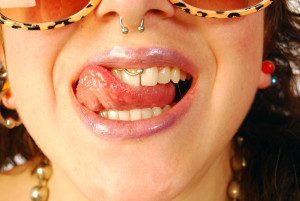 If you have teenagers, or have spent any time around teenagers, you’ll know how popular piercings have become. And it isn’t just the usual ear piercings. You’ll likely see nose, lip and tongue piercings as well. Body piercing, far from being a newfangled thing, has a history that dates back to ancient times, some 5,000 years ago. Lip and tongue piercings are seen in American and African tribal cultures. People may want piercings for a religious or spiritual reason, or it may be purely aesthetic. But is it healthy to get a piercing on the lip or tongue? Could there be any dental health complications? A Swedish study was conducted to find out.
If you have teenagers, or have spent any time around teenagers, you’ll know how popular piercings have become. And it isn’t just the usual ear piercings. You’ll likely see nose, lip and tongue piercings as well. Body piercing, far from being a newfangled thing, has a history that dates back to ancient times, some 5,000 years ago. Lip and tongue piercings are seen in American and African tribal cultures. People may want piercings for a religious or spiritual reason, or it may be purely aesthetic. But is it healthy to get a piercing on the lip or tongue? Could there be any dental health complications? A Swedish study was conducted to find out.
Research Regarding Piercings and Jaw Discomfort
Researchers at the University of Gothenburg studied young people with oral piercing jewelry to see if there was any connection between this lifestyle choice and pain resulting from TMD (temporomandibular) disorders. Their study found a relationship between piercings and jaw issues, in that teenagers with oral piercings had greater tenderness of their chewing muscles and more frequent headaches. A total of 124 high school students were involved in the study. Questions were also asked regarding jaw symptoms and parafunctional oral habits like gum chewing, tooth clenching, nail biting and tongue thrusting. It was found that piercings in the mouth caused added strain on the temporomandibular system. This can contribute to repetitive strain and injury in that area.
Oral Piercings and Oral Health
Another problem that can occur with mouth piercings is increased bacteria. There are millions of bacteria in the mouth, and a piercing can frequently lead to swelling, pain and infection. Other dental health problems that can occur with piercings include:
- Cracking a tooth, if a piece of the jewelry breaks in your mouth and you accidentally bite down on it. Clicking of the jewelry against teeth can also cause some damage.
- Blocking of airway, if mouth and tongue swells from infection.
- Problems with chewing, swallowing or speech from the piercing of lips, tongue or cheeks.
- A serious infection, such as endocarditis or hepatitis, may develop due to mouth piercings.
- Damage to gums, teeth or fillings, if one regularly plays with the piercing.
- An allergic reaction can form at the site of the piercing, if one is sensitive to metals.
- Nerve damage, which may result in a numb tongue (usually temporary but at times permanent).
- Increased saliva production and possibly drooling can occasionally occur.
- X-ray blocking may occur if the piercing and jewelry interferes with the taking of x-rays.
What Can Be Done to Minimize Oral Health Problems from Mouth Piercings?
If a teenager already has piercings, there are some steps they can take to minimize complications for their oral health. This includes keeping the site of the piercing especially clean, particularly any areas on the jewelry itself that may be a bacteria magnet. They should rinse after each meal. They should also immediately see their doctor or dentist if they experience any signs of infection, such as pain, fever, chills, shaking, swelling, or a red-streaked color around the piercing.
Tell them to not click the jewelry against their teeth and to try to avoid placing any stress on the piercing. They should also make sure the jewelry is tight so there’s no choking or swallowing danger. Always remove the piercing when playing sports and use a mouth guard for protection. Practice regular dental hygiene (brushing and flossing) and see a dentist for regular visits.







Leave a Reply